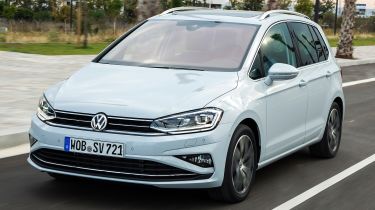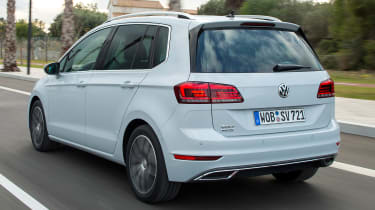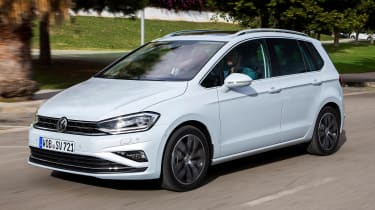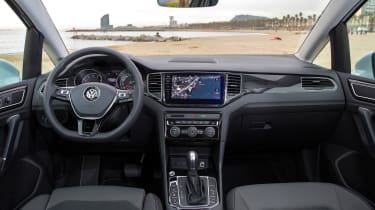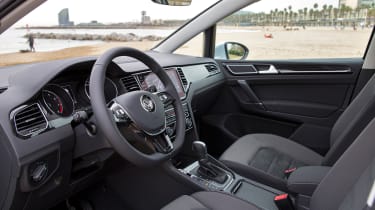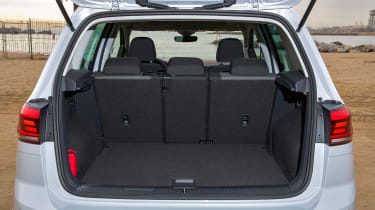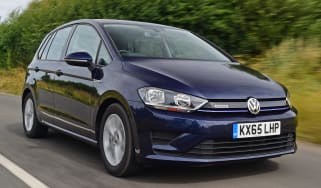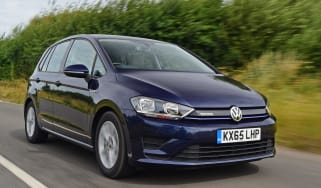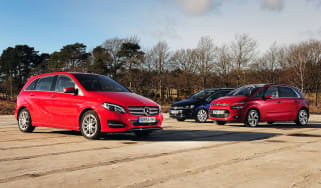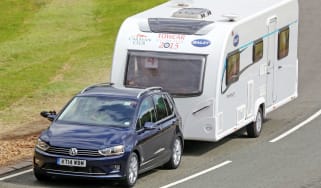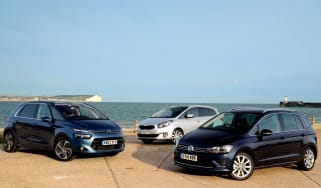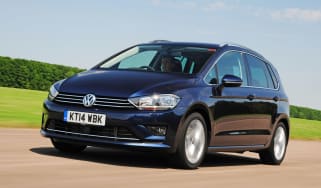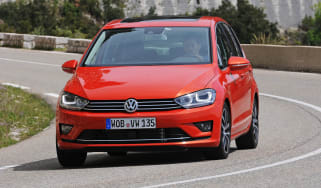Volkswagen Golf SV review
The Volkswagen Golf SV is a more practical version of the popular family hatchback, known as the Sportsvan in other markets

The Volkswagen Golf SV is a bigger and more practical alternative to the standard Golf hatchback. It’s the successor to the old Golf Plus but it’s now longer, wider, and taller, rivalling cars such as the Ford C-Max, Citroen C4 Picasso and BMW 2 Series Active Tourer.
The Golf SV not only looks like the standard hatchback with which it shares part of its name, but all of the running gear and the versatile MQB architecture has also been adopted. It means the engine range – which is now 20 per cent more fuel efficient – can be carried over, with four turbocharged petrol and three turbo diesel engine available. A light update in 2017 brought about a series of changes first seen on the Golf Mk7.5, including LED lights and new safety tech.
Buyers can choose from a range of trims, starting with the entry-level S, through SE, SE Nav and flagship GT. Power outputs range from 84bhp to 148bhp, with five and six-speed manual transmissions available. Those after a self-shifter can opt for the seven-speed automatic DSG gearbox, which is offered on all engines apart from the very basic version.
While the latest 1.5-litre TSI Evo engine does feature, it misses out on the Golf BlueMotion's fuel saving coasting tech – meaning no SV emits less than 100g/km of CO2.
More reviews
In a world where fashionable SUVs are flavour of the month, cars like the Volkswagen Golf SV offer increasingly limited appeal. Their crossover equivalents offer almost as much space and just as much comfort and refinement – but with heaps more desirability.
However, as rivals have dropped off, the Golf SV stands strong, and remains a compelling proposition for those in the market for something other than a crossover or SUV. The engines are excellent and the SV drives well, too. With new kit and LED lights, safety tech and material choices, the facelifted version is better than ever.
Engines, performance and drive
As the Volkswagen Golf SV is based on the standard hatchback, there’s very little separating them when it comes to fun behind the wheel. The handling is responsive and the Golf SV holds the road surprisingly well, with only a little more body roll noticeable over the hatch. Even on passive dampers (rather than the optional DCC set-up) the Golf SV is a comfortable, if a little predictable, car to drive.
There's not much feel through the wheel, but the steering is direct - making the SV easy to drive. Big windows means it isn't all that tricky to park, either, which is particularly handy if you spend much of your time in town.
The we've not tried the entry-level 84bhp 1.0-litre TSI engine, but the more powerful 108bhp car is a great all-rounder. We've also driven the latest 1.5-litre TSI Evo engine, which proved punchy and refined. The DSG automatic gearbox is among the best automatics in the business, too, and a worthy companion to the SV's relaxed character.
Engines
The SV is available with a range of petrol and diesel engines. The entry-point into the range is the 84bhp 1.0-litre TSI, but if your budget allows, then we'd step up to the more powerful 108bhp version, which offers appreciably more shove – especially with passengers on board. The two entry-level three-cylinder petrols are joined by a pair of four-cylinder TSI Evo units - with either 128bhp or 148bhp. Auto boxes are available.
If you're after a diesel, you have a choice of a 113bhp 1.6 TDI or more powerful 148bhp 2.0-litre TDI. If you cover big miles these are still worth considering – especially the higher power unit, which feels quick even when fully laden.
MPG, CO2 and Running Costs
By using the frugal petrol and diesel engines from elsewhere in the VW range, whichever model you choose, the Golf SV should prove an economical family car. The most frugal petrol model is the entry-level 84bhp 1.0 TSI, which Volkswagen claims will do 57.6mpg and 112g/km of CO2. That's pretty competitive, though regularly loading your car to the brim with people or luggage will see fuel economy plummet.
If you're regularly carrying a full load, the more powerful petrol models might be worth considering. They're more expensive to buy, but given their more potent power output, are surprisingly efficient to run. Even the top-spec 148bhp 1.5 TSI Evo will do 54.3mpg, with 118g/km CO2 emissions. If your budget will stretch, they're well worth the extra cash.
The diesels might be less stressed, but they're not much more economical. The 1.6 TDI will do 67.3mpg and emit 110g/km of CO2, while the most powerful 148bhp 2.0 TDI does 60.1mph and 122g/km.
VW used to offer a fully-fledged Bluemotion Golf SV model with low rolling resistance tyres and longer gearing, enabling it to return 76.3mpg with CO2 emissions of just 95g/km. It was discontinued when the Mk7.5 car arrived in 2017.
Insurance groups
Insurance groups for the facelifted Golf SV haven't been revealed yet, but we don't expect premiums to rocket – especially given the new car's improved safety tech.
Depreciation
The diminishing appeal of MPVs is reflected in the Golf's residual values. Most models are expected to retain less than 40 per cent of their value after three years or 36,000 miles, which is pretty poor in this day and age. Still, the numbers are a little better than the equivalent Citroen C4 Picasso, but newer SUV rivals beat both cars hands down.
Interior, design and technology
Given the huge success of the standard Golf, it’s no surprise that the SV’s styling is heavily influenced by its smaller sibling’s. With its straightforward design, solid proportions and upright tail, it looks more like a tall family hatch than a traditional MPV.
Yet while the design is modern and well executed, it lacks the futuristic looks and bold detailing of the more daring C4 Picasso. A mid-life facelift towards the end of 2017 brought about the Mk7.5 Golf's subtle changes - including tweaked lights and bumpers, and fresh paint colours. Inside, Volkswagen added new trim, fabrics and leather, as well as the firm's updated infotainment system.
This interior layout works well and is easy to get comfortable. What the Golf lacks in ultimate style, it makes up for with excellent quality, with soft-touch materials on the doors and dash, and a crystal clear screen, easy-to-read dials and an ergonomically designed cockpit.
The standard kit list is generous, too. All cars get air-con, Bluetooth and a DAB radio, while higher-end models feature nav and other goodies.
Sat-nav, stereo and infotainment
Lifted straight from the standard Golf, the SV's eight-inch infotainment system is crystal clear and easy to use. It's super responsive, with loads of functionality and a logical set of sub-menus. The optional Discover Navigation Pro system gets an even bigger 9.2-inch screen – giving the SV drivers the allure of much more expensive and luxurious models.
Practicality, comfort and boot space
The Volkswagen Golf SV was designed from the outset to excel in one particular area, and this is it. The taller and wider dimensions of the new model (over the previous Golf Plus), added to the 48mm increase in wheelbase, means it easier to get in and out. Once inside there’s ample space for the driver and four adult passengers.
Having said that, despite being classed as an MPV, there's no seven-seat version – so those after a car that can carrying two extra people should look towards the ageing VW Touran, or even larger Sharan models. Citroen offers a seven-seat Grand C4 Picasso, while Renault gives buyers a choice of Scenic and Grand Scenic models, too.
Visibility is pretty good, though, thanks to the raised driving position, big windows and large glasshouse. This makes parking and city driving nice and simple, which is good, as that's where many of these cars will spend most of their time.
Size
As the Golf SV is only available with five seats, it's more compact than some rivals. Many competitors offer a variety of bodystyles, however, which make them more practical overall. At 4,351mm long its a few millimetres longer than a BMW 2 Series Active Tourer, but shorter than that car's seven-seat Grand Tourer sibling. At 1,807mm wide, the SV is 17mm slimmer than the standard Golf hatch.
Leg room, head room & passenger space
Whichever way you look at it, the Golf SV is a spacious and practical family car. Space in the back is very good, with the high roofline working wonders for headroom. There are tray tables on the backs of the front seats, and big door bins up front for carrying bottles, bits and bobs.
Boot
The 590-litre boot on the latest Mk7.5 Golf SV is bigger than before, some 210 litres more than what’s offered in the standard Golf hatchback model. Whereas the SV’s predecessor fell short of its rivals when it came to practicality, the new Golf SV is right amongst its rivals this time around.
It offers more interior space than the Ford C-Max and Renault Scenic, plus if you need to carry larger loads, the rear seats slide forward to free up space. Fold everything down and the total load volume swells to 1,520 litres. A BMW 2 Series Active Tourer is 10 litres smaller overall.
Reliability and Safety
The SV is built on the same MQB platform as the Golf Mk7, which finished our Driver Power 2017 satisfaction survey in a highly respectable 18th overall. The VW also uses a familiar line-up of tried-and-tested petrol and diesel engines, boosting its chances of providing stress-free service. Our car felt extremely robustly built, too, so it should comfortably withstand the rough and tumble of family life.
A five-star Euro NCAP rating proves that VW hasn’t scrimped on safety with the SV. All versions get seven airbags and tyre-pressure monitoring, while the Mk7.5 facelift added kit like TFront Assist and Pedestrian Monitoring as standard, as well as optional kit like Adaptive Cruise Control and Traffic Jam Assist.
Warranty
Every Volkswagen comes with a three-year, 60,000-mile warranty. That puts it on par with Citroen, but slightly behind Renault, which offers a four-year package as standard. Even BMW gives buyers an unlimited-mileage warranty, valid for three years.
Servicing
The VW Golf SV follows the standard Golf hatchback in terms of servicing, which means it'll need a check-up every 12 months or 10,000 miles. Fixed price servicing is also available.
